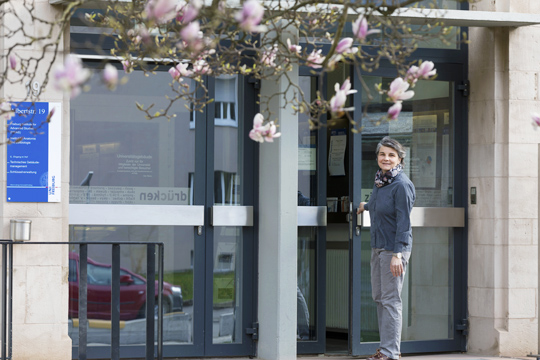Hey there, neighbor!
Freiburg, Apr 06, 2018
When the Freiburg Institute for Advanced Studies (FRIAS) opened its doors ten years ago in Alberstraße 19, she moved into its first office: The historian Prof. Dr. Sabine Dabringhaus spent a year and a half as a research fellow at the Research College established in 2008, where she worked side by side with international scientists from various disciplines. For the anniversary, the East Asia history expert told Sonja Seidel why the proximity to various disciplines furthered her own research and how she experienced the Institute’s founding days.
 Sabine Dabringhaus particularly appreciated being able to concentrate solely on her research at FRIAS. Photo: Jürgen Gocke
Sabine Dabringhaus particularly appreciated being able to concentrate solely on her research at FRIAS. Photo: Jürgen Gocke
Frau Dabringhaus, how were your first days at FRIAS?
Sabine Dabringhaus: It went something like this: I placed the key in the lock, opened the room, switched on my laptop and got started. I had already been working on a small volume for a historical paperback series and was able to finish the manuscript within four weeks. At the time, fellows were at FRIAS for three semesters, which we were able to freely manage ourselves. I spent a full year there, then later another six months. I was able to take a complete hiatus from teaching and concentrate fully on my research work.
So that must have been a distinct advantage that FRIAS offers?
Yes, absolutely. To have your own room, be able to close the door and work in peace without interruption, grab a coffee in the lounge now and again – it was great. Especially for me as a mother – at the time my son was still in school. It was ideal to have a research fellowship on site. At the time I had an offer to accept a fellowship in Uppsala, Sweden, but I preferred FRIAS. I had my own office with a book delivery service and an IT specialist to help with any computer issues that arose. But what I also remember fondly are the rewarding conversations. Back then there were four difference research areas or so-called schools. The structure enabled us humanities scholars to have substantive discussions with other closely related disciplines. I could exchange ideas, for instance, with colleagues from political science or ethnology.
This experience must have helped you attain new perspectives for your research.
During the later phase of my fellowship at FRIAS, I had an office next to Kate Rigby, one of the co-founders of Environmental Humanities in Australia. She drew my attention to a research area that I would not necessarily have known otherwise. The workshops with international guests who organize the FRIAS on a regular basis were helpful for advancing conversations.
How does your work differ from the time spent at the Institute?
The main difference is that you can concentrate fully on research at FRIAS, something from which teaching certainly profits because you return to it with new ideas.
Is there something you learned during your time at FRIAS that you still use to this day?
Indeed: I have no hesitation around interdisciplinary thinking and collaborations with colleagues from completely different areas, which benefits joint projects that are now playing a decisive role in our day-to-day research at the universities. My work in the Directorate at the Centre for Medicine and Society has also benefited. As a historian, I am a bit of an outsider amongst the doctors and social scientists. In our master’s degree program “Global Urban Health”, we discuss epidemics and the global comparison of urban living conditions, issues that I don’t necessarily deal with on a daily basis in my research. I learned at FRIAS how to be open and consider which urbanization issues from China’s perspective I could integrate into the project. In addition, I sharpened my awareness about intercultural knowledge exchange. That helps with my students who come from all over the world. FRIAS provided a wonderful place to cultivate both of these skills.
The Freiburg Institute for Advanced Studies (FRIAS) is celebrating its tenth year anniversary on June 29, 2018. All University members are warmly welcome to attend. More information about the program will be announced on the FRIAS Website soon.
More information

